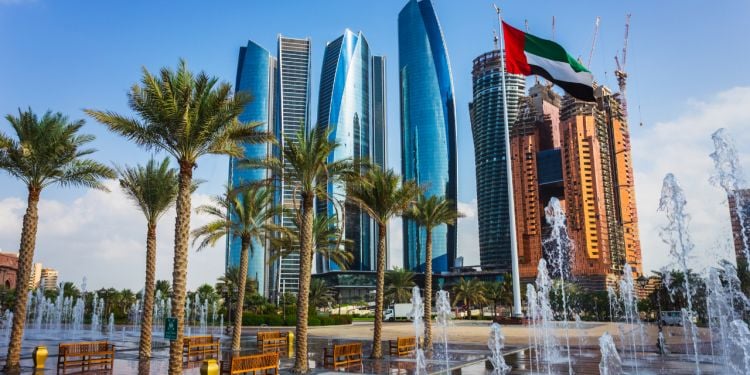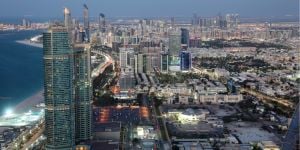
The United Arab Emirates (UAE) is not only a popular destination for visitors around the world but also a great place to work for expatriates. The UAE takes pride in its natural beauty, rich cultural heritage, warm hospitality, and modern facilities. Expatriates who work in the UAE benefit from these and receive tax-free salaries.
Apart from the fact that you can enjoy your full salary without income tax, there are a number of benefits of working in the UAE. One of these is the employment opportunities available in the country. There are thousands of job vacancies for expats to apply to in a market that is continuously growing with new businesses, projects, and investments.
First steps to working in the UAE
To work in the United Arab Emirates, you need a visa and a work permit and will need to have a job offer to be eligible to apply for a work permit. You can look for jobs while you are outside of the UAE. Once you land a job, your employer can sponsor you for the visa application and will even pay the related fees, depending on your work contract. Most jobs in the Emirates are offered online, and employers will contact you should they be interested in meeting you. Rarely does one have to go to offices door-to-door to drop off a Curriculum Vitae. Once you have been hired, your employer will handle the process of securing a resident visa.
Job hunting in the UAE
To find a job in the United Arab Emirates, you can search for vacancies in online local newspapers like Gulf News, Khaleej Times, or Emarat Al Youm, government or private job portals, or register with licensed recruitment agencies.
UAE-based recruitment agencies are plentiful, and you can often find ones that specialize in particular job industries or sectors, as well as others that are more general. Some of the top recruitment agencies in the UAE are:
- Michael Page;
- Hays;
- Salt.
You can also browse the websites of companies or organizations, as they often mention job vacancies in the careers section. You may also want to ask around friends and family if they know of any job openings so that they can recommend you to speed up the employment process. Also, consider getting a free CV review at TopCV.
Please note that there are no fees if you land a job via a recruitment agency — these fees are usually borne by the employer.
Important:
It is illegal to work on a tourist or visit visa, which could lead to fines and deportation.
Key job industries in the UAE
No matter what type of job you're looking for, you're likely to find exciting opportunities in the UAE. However, some industries stand out more than others.
Oil and gas
As many might have guessed, the oil and gas sector is the most important industry in the UAE, accounting for a third of the country's total GDP. Investments in this sector have continued to grow thanks to low corporate taxes and developments in technology.
Opportunities are available in this sector for field specialists, technicians, engineers, account managers, administration, and more.
Some of the main companies in the oil and gas sector are:
Construction
The UAE has grown from a predominant desertland into a continuously developing and bustling country with metropolitan cities, which has made its construction industry another key one to be highlighted. New projects and developments are on the rise with no signs of slowing down, specifically in Dubai and Abu Dhabi.
Opportunities are available in this sector for project managers, technicians, supervisors, engineers, and more.
Some of the main companies in the construction sector are:
- Khansaheb Civil Engineering;
- Al Habtoor Group;
- Al Futtaim;
- Al Jaber Group;
- Dubai Contracting Company.
Renewable energy
As the most recent host of Cop28, the UAE's commitment to sustainability has been at the forefront of its vision for the future. The country is in search of alternative means to produce the power needed to fuel its economy. Some of its goals are to create 50,000 green jobs and triple its renewable energy capacity to 14 GW by 2030.
Opportunities are available in this sector for engineers, analysts, project managers, consultants, researchers, and more.
Some of the main companies in the renewable energy industry are:
Tourism and hospitality
The UAE is known for being one of the top tourist destinations worldwide, breaking its own records in the first half of 2023 alone. The country has further put forth 25 initiatives as part of its 2031 UAE Tourism Strategy, aimed at further supporting the development of its tourism sector. Dubai has especially seen a significant rise in tourism over the past year.
Opportunities are available in this sector to work in hotels, dining facilities, tourist attractions, and more.
Healthcare
Another industry the UAE has focused on is healthcare. Major investments in the advancement and development of this sector have seen a huge demand for professionals. In Dubai alone, a free zone (Dubai Healthcare City) has been created dedicated to healthcare development and is currently home to 10 hospitals and 168 clinical facilities.
Opportunities are available in this sector for healthcare professionals, researchers, and administration.
Some of the main companies in this sector are:
Cybersecurity
With rapid technological advancements come a host of vulnerabilities. The need for professionals to identify and eliminate cyber threats has rapidly grown as the UAE continues to develop. The country has taken major steps within this sector, starting with the establishment of the UAE Cybersecurity Council in late 2020.
Engineers, analysts, and consultants specializing in cybersecurity will have no trouble finding work opportunities.
Some of the main companies in this sector are:
Jobseeker visa in the UAE
If you haven't had any luck finding a job while outside of the UAE, you have the option to apply for a Jobseeker Visa. This visa was introduced to allow those who wish to work in the UAE and would like to visit the country to explore job opportunities.
The validity of this visa is 60, 90, or 120 days, and it allows you to search for job opportunities without the dependency of a sponsor.
In order to be eligible for this visa, the applicant must have:
- Skill Levels 1, 2, or 3 as per the Ministry of Human Resources and Emiratisation professional levels of jobs:
- Level 1: Legislators, managers, and business executives,
- Level 2: Professionals in scientific, technical and human fields,
- Level 3: Technicians in scientific, technical and humanitarian fields;
- Graduated from the listed top 500 universities within the past 2 years;
- Hold a bachelor's degree or equivalent;
- Be able to provide a financial guarantee of AED 1,000.
The fees for this visa range between AED 1,260 and AED 1,460, depending on the duration selected.
The jobseeker visit visa needs to be applied for online.
Secure a work permit before a resident visa in the UAE
Work permits are issued by the Ministry of Human Resources and Emiratisation (MoHRE) of the United Arab Emirates. Your employer will need to apply for your work permit, which will allow you to enter the UAE for employment. This permit is valid for 2 months after the date of issue. Once you're in the country, the employer sponsoring you should then proceed to complete other formalities such as medical testing, obtaining an Emirates ID card, a Labour Card, and the work residency permit stamped on your passport within 60 days. The work residency permit is issued by the General Directorate of Residency and Foreigners Affairs (GDRFA) from the emirate where you will be employed.
If you're outside the United Arab Emirates, note that there are Visa Service centers in various parts of the world. These have been set up by the Ministry of Human Resources and Emiratisation (MoHRE) and the Ministry of Foreign Affairs and International Cooperation. The aim is to expedite the process of work visas and ensure complete transparency between employees and employers. At the Visa Service Centre, you will have access to relevant information pertaining to your job in your own language.
If you are applying for a work permit, your passport should be valid for at least 6 months after the date of entry into the UAE.
Labor laws in the UAE
Employment in the United Arab Emirates is governed by the UAE Labor Law. You may wish to consult the government portal for specific laws and regulations applicable to various sectors (private, public, and those working in free zones). However, some key takeaways in the Labour Law for employees in the private sector are:
Working hours
Normal working hours are an eight-hour workday or 48 hours a week (some businesses, such as hotels and eating outlets, can request a longer workday from the MoHRE). It's important to know that the law also states that employees should not be made to work more than 5 consecutive hours without rest, meals, and prayer time. There is also an overtime limit of 2 hours per day, though there may be exceptions per industry.
Normal working hours are reduced by two hours during the holy month of Ramadan, and companies have the freedom to apply flexible or remote working patterns during this time.
Employees in the construction industry are not allowed to work during designated “hottest hours of the day” during the summer months. Failure to observe this will result in a hefty fine of AED 5,000 per employee for the company.
Probation period
As per UAE law, the probation period set for new employees cannot exceed 6 months. It is also prohibited to place employees under probation more than once. If your employer wishes to terminate your contract during the probation period, they must give you a minimum of 14 days' notice.
Leave entitlements
While some companies may award their employees extra leave days, such as on birthdays or mental health days, there are specific leave entitlements for private sector employees drawn out by the UAE labor law:
- Annual leave – Once employees have completed one year of service, they are entitled to 30 calendar days of annual leave. If the employee has only completed 6 months of service, they are entitled to 2 days per month;
- Compassionate leave – Also known as “bereavement leave”, employees are entitled to a certain number of days in the unfortunate event of a death in the family. In the event of the death of a spouse, 5 days off are granted, while only 3 days are given in the event of the death of a parent, child, sibling, grandchild, or grandparent;
- Maternity leave – Women are given a total maternity leave of 60 days. Of these 60 days, 45 days are fully paid, while 15 are to be half-paid. Maternity leave can be applied for up to 30 days before the expected delivery date. If the employee is unable to resume work immediately after her maternity leave due to illness, she may request an additional 45 days of unpaid leave without the risk of losing her job. If the baby is sick or has a disability, the employee is entitled to an additional 30 days of paid leave. Once the employee resumes work, she is entitled to 1–2 hours of additional breaks (of no more than one hour each) per day for nursing for up to 6 months after delivery;
- Paternity leave – Fathers are able to apply for 5 working days of paid paternity leave, which can be taken any time between the day of the child's birth up until 6 months;
- Day of rest – All employees are entitled to a minimum of one paid rest day per week;
- Official holidays – If an employee is required to work during public holidays, they should be compensated with either another day off or be paid their normal wage for that day;
- Sick leave – Employees in the UAE are entitled to 90 sick days, 15 of which are to be paid in full, 30 days with half pay, and 45 days unpaid with no risk of losing their job.
These are the bare minimum entitlements according to the UAE law, but you will find that some employers may be more flexible with leave days.
If you happen to leave your job before using up your annual leave days, you can be financially compensated for each day based on your daily wage (basic salary).
Equal rights and anti-discrimination
As of 2018, the UAE introduced a law to ensure that women and men were paid equal wages for the same work. This gives women the chance for equal job opportunities, as well as protection in the workplace. In addition to this, it is illegal to fire women on the basis of pregnancy.
The law also prohibits discrimination in the workplace based on someone's race, gender, sex, religion, nationality, or disability.
End-of-service gratuity
You're probably just about to start working in the UAE, but it's always good to know your full rights when it comes to leaving a job. End-of-service benefits used to be only given to employees who had completed 5 years at their respective jobs. However, this has now been changed to include all employees who have served at least one year of continuous work. The end-of-service gratuity is calculated based on your most recent basic salary and must be paid within 14 days of your contract's end date.
If you leave after working with the same company for more than a year but under 5, you are entitled to 21 days' salary per year of work.
If you leave after working with the same company for more than 5 years, you are entitled to 30 days' salary per year of work.
It should be noted, though, that the total gratuity received cannot exceed the wage of 2 years.
Some companies may opt to subscribe to a “savings scheme” instead, which allows you to invest your end-of-service benefits in funds that can be claimed once you leave the company.
Working for Free Zone companies in the UAE
It is worth mentioning that if the company you work for operates out of one of the UAE free zones, they are not obligated to follow the UAE labor law. Instead, they would follow that free zone authority's specific rules and regulations. So it would be worth familiarizing yourself with these before signing your contract in order to be aware of your rights as an employee.
UAE free zones are areas in which expats and foreign investors are able to have full ownership of companies established there.
Good to know:
People suffering from sexually transmitted diseases such as HIV are not eligible to obtain a work permit in the United Arab Emirates, and so are people who test positive for tuberculosis. An X-ray during the medical tests for visa application is required to screen for this.
All recruitment and travel costs must be covered by your employer.
Knowledge of Arabic is definitely an asset, even though English is widely used in the workplace.
Useful links:
Ministry of Human Resources and Emiratisation
We do our best to provide accurate and up to date information. However, if you have noticed any inaccuracies in this article, please let us know in the comments section below.












Comments